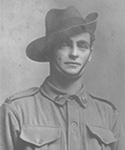
Percy Clarence Tuck
Percy Clarence Tuck was born on the 14th of October, 1889, at Warrenmang, near the town of Avoca, Victoria. He joined the NSW Fire Brigades on 16th November 1910, stating his previous occupation as farm labourer. Tuck served at; No 1 Station Headquarters, No 11 Station Paddington and while temporarily attached to the Katoomba Fire Brigade from the 17th of March 1913, was made the Officer in Charge of the Brigade on the 15th of February 1914.
Tuck had been promoted to the rank of First Class Fireman on the 16th of November 1913.
He resigned on the 28th of November 1914, having enlisted into the First AIF on the 26th of November 1914.
Tuck was posted, as a Private, to the 3rd Reinforcements of the 4th Battalion, with the regimental number of 1672. Due to an administrative error, he was later allotted the number 1520.
He departed Sydney on the “Seang Choon”, on the 11th of February 1915, being part of the convoy which eventually left Albany WA, as the first Australian convoy to sail for the Great War.
After training, build up and Suez Canal defence duties in Egypt, Tuck embarked at Alexandria, Egypt, to join the Mediterranean Expeditionary Force, for the Gallipoli Campaign, on the 5th of April 1915.
The 4th Battalion, with Tuck amongst their number, landed at approximately 08:00 hours on the 25th of April 1915 as part of the second and third waves. For the majority of the first day, the 4th Battalion was held in reserve, defending the beachhead, but at 17:00 hours, the 4th was directed to march to the south, forming on the left of the 8th Battalion, along Bolton's Ridge. They arrived just in time to help counter probing attacks, by the Turkish 27th Infantry Regiment, from the south.
The consolidation of the beachhead continued and the 1st of May entry in the Battalion’s War Diary records: A Coy was "in support and in the trenches for most of the day receiving Artillery Fire "HELL", M.G.'s very hot also sniping all the afternoon"
1520 Private Percy Clarence Tuck, died of wounds received on Saturday the 1st of May 1915. How he actually died is unknown, but his body was never recovered and he is commemorated on the Lone Pine Memorial at Gallipoli.
For his service, Tuck received the1914 / 15 Star, British War Medal and the Victory Medal.
